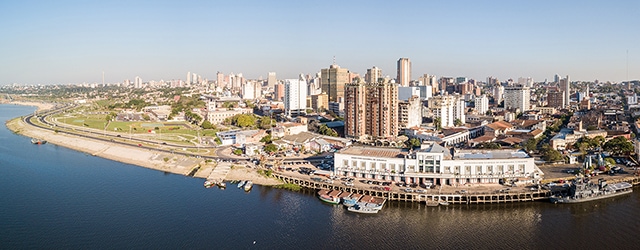Paraguay has worked at increasing its macroeconomic stability, with notable success.

|
PARAGUAY: VITAL STATISTICS |
|---|
|
Location: Center of South America |
|
Neighbors: Argentina, Bolivia, Brazil |
|
Capital city: Asunción |
|
Population (2019): 6,943,469 |
|
Official language: Spanish; Guarani |
|
GDP per capita (2018): US$5,964 |
|
GDP growth (2018): 4.0% |
|
Inflation (2017): 5.2% |
|
Currency: Guarani |
|
Investment promotion agency: Red de Inversiones y Exportaciones (Rediex) |
|
Investment incentives available? Full repatriation of capital and profits; a range of tax breaks and incentives, some of them increasing when the investment is above $5 million |
|
Ease of Doing Business rank (2019): 113 |
|
Corruption Perceptions Index rank (2017): 135 |
|
Political risks: Politically motivated changes in leadership of regulatory agencies can have an impact on companies and investors; ruling Colorado Party reportedly has serious internal divisions; conflicts and protests over land ownership |
|
Security risks: Risk in some areas due to violent crime; kidnappings |
|
PROS |
|---|
|
Ruling Colorado Party has a business-friendly agenda |
|
Stable banking system |
|
Recent upgrade by Fitch and affirmations from Moody’s, S&P |
|
Plans for new terminal for airport |
|
Plans for infrastructure improvements by 2030 |
|
CONS |
|---|
|
Landlocked |
|
Economy is subject to external risks and changes in demand |
|
Difficult to enforce contracts |
|
Lengthy bureaucratic procedures |
|
Unclear potential outcome of reform efforts of Mercosur |
|
Poverty rate of 26.4% |
|
Trademark infringement and counterfeiting |
|
Illicit cigarette trade |
|
Sources: Best’s Country Risk Report: Paraguay; Bloomberg; CIA World Factbook; Foreign Travel Advice: Paraguay and UK governments; International Monetary Fund; Latin American Herald Tribune; Moody’s Investors Service; New York Times; PwC; Reuters; Transparency International; US State Department; World Bank; World Population Review |
|
For more information, check out Global Finance‘s Paraguay Economic Report data page. |
The Paraguayan economy puts Carlos Fernández Valdovinos, former governor of Banco Central del Paraguay, now director at Banco Basa, in mind of Charles Darwin. Paraguay has had to adapt to survive rising interest rates, falling commodity prices and their impact on major trading partners such as Brazil and Chile, and other changes.
“Paraguay didn’t forget what is important, and that is macroeconomic stability,” Valdovinos says during an interview from Asunción, the country’s capital. “We continued to keep a tight fiscal policy.” The country’s finances are now in order. “Their debt is very low, and the government has a strong fiscal position,” says Samar Maziad, vice president and senior analyst at Moody’s Investors Service. Nonetheless, she notes, high volatility in its GDP growth “contributes to its moderate economic-strength rating.”
The stability follows some disastrous years. “In 2001 and 2002, we were even in a selective default according to some rating agencies,” Valdovinos recalls. Banks were forced to roll over bonds. A 2003 IMF deal let the government reorganize its finances.
José Cantero, the current central bank governor, sees Paraguay’s economic equanimity as a marketable feature that distinguishes Paraguay from Argentina. “Argentina is known for heavy, heavy government spending,” explains Anthony Kim, a senior policy analyst at the Heritage Foundation and author of a research paper on Paraguay. By comparison, “Paraguay is really an oasis of stability.”
The country is a major supplier to the huge Brazilian market, which draws foreign direct investment (FDI). “Paraguay has numerous economic advantages, especially when you compare it to Brazil or Argentina,” Valdovinos says. Corporate, personal income and value-added taxes are all 10% or less. Electricity is 40% cheaper than in Brazil. Paraguay’s young workforce underpins its FDI priorities; The government seeks labor-intensive projects, Valdovinos explains, “to create jobs for all those young people.” Leaders are also working to expand banking access. “They are trying to grow their financial sector,” says Kim. “Basically growing the market.” The government is making efforts to address institutional corruption and strengthen its legal bodies. “They streamlined the business-creation process,” says Kim.
Yet the political environment is not as stable and nurturing as the economic environment, in Moody’s assessment of a range of government indicators. “Paraguay’s institutional indicators are much weaker than others [in terms of] their control over corruption [and] rule of law,” Maziad says.
More seriously, Paraguay has drug and firearms trafficking; poorly policed borders enable drug smuggling between Paraguay and Bolivia, Argentina and Brazil. In 2017, Paraguay imported nearly $15 million worth of munitions, leading American authorities to halt commercial gun shipments to the country from the US.
Brazil’s drug trade is spilling over into Paraguay, bringing death threats and murders. The crime relationship between the two countries has some irony: A Brazilian crime kingpin arrested in Paraguay admitted to crimes there and committed a murder in the vain hope of being detained there rather than extradited back to Brazil.
Moreover, the pledge last December by Brazil’s then-president elect (now President) Jair Bolsonaro to allow all Brazilians without criminal records to own firearms can be expected to have some impact.



